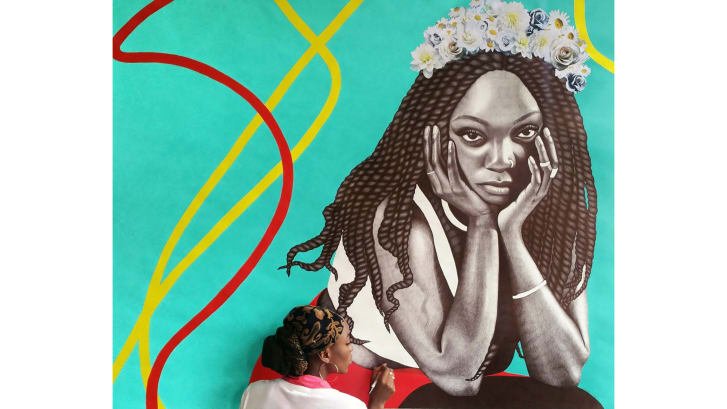Nigerian artist illustrating the human experience with a ballpoint pen
From a distance, Jacqueline Suowari’s larger-than-life portraits look like monochromatic photographs overlaid with colorful graphics. Upon closer inspection, you see these dramatic images are the culmination of thousands of tiny lines made using a simple ballpoint pen.Suowari, 31, has been an artist since she was a child, practicing professionally for over a decade. She studied Fine Art at the University of Port Harcourt in southern Nigeria, and has participated in group exhibitions globally and had solo exhibitions in Miami and Nigeria.Her work has been featured in several publications including Chukwuemeka Ben Bosah’s book, “The Art of Nigerian Women,” which celebrates female artists from the Nigerian diaspora.This June she launched a touring exhibition of her new body of work entitled “Now I Wear Myself.” In her new exhibition, Suowari considers the fetishization and condemnation of aesthetics associated with indigenous Nigerian cultures, and tries to destigmatize subjects that are often taboo in the country, like depression, grief and shame.

Philosophy with a ballpoint pen
As a child Suowari didn’t know whether to be an artist, a poet or a dancer — so she decided to be all three. “Somehow, I’ve been able to merge all these things together to form the Jacqueline Suowari experience,” she laughed.
DESCRIBING MY SELF IN VISUAL WAY:
“I describe myself as a visual artist who specializes primarily with the ballpoint pen,” said Suowari. Her practice is a combination of intricate drawings paired with bold Afro-urban painted elements in poppy, primary colors. These works — often up to eight feet tall — are accompanied by poetry and performance art.”With my drawings, I have this philosophy of layering — it’s just a way that I pattern my strokes upon each other,” explained Suowari. “I like to look at each stroke as the human experience. One experience, one stroke — and the gathering, and layering, and falling together of all the strokes creates the person and their character.”
MUHAMMAD TARIQ ZAMAN
Philosophy

Leave a Comment